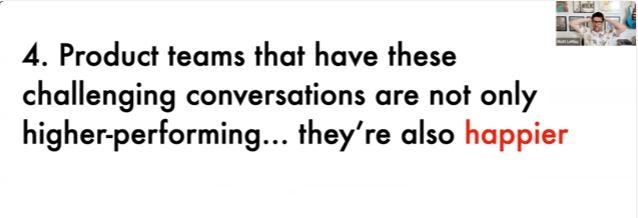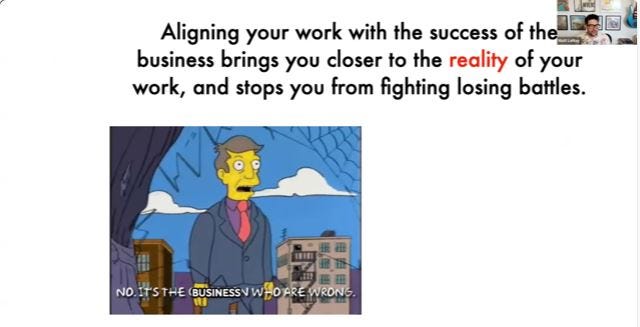Why Product Managers Are Happier When They Focus on Business Impact
The Surprising Secret to Happier Product Teams: Stop Fighting Reality. Impact First Team are Happier!
When Matt LeMay set out to research his book “Impact-first Product Teams: Define Success. Do Work That Matters. Be Indispensable.” he expected to find something entirely different from what he discovered. He anticipated that product managers focused on business impact would be the most stressed, constantly anxious about hitting targets that seemed beyond their direct control.
Instead, he found the exact opposite: the most commercially minded, impact-focused product managers were actually the happiest people he interviewed.
This counterintuitive finding reveals something profound about workplace satisfaction that challenges everything we think we know about product management and happiness at work in general.
👋I’m Irene Liakos. A product management and growth expert with over 2 decades of experience growing product profitably across Telco, Banking, Fintech, AI, Data, Travel, Ecommerce and more. I teach, coach and advise product managers and business leaders. Reach out to me if your products aren’t delivering the value you need for your business to grow. You can contact me at irene@phronesisadvisory.com
The Misery of Fighting Windmills
To understand why impact-first teams are happier, we first need to understand why so many product teams are miserable.
Picture the typical frustrated product manager: they've read all the books, attended the conferences, and absorbed the gospel of "product-led" companies. They know exactly how things should work. Products should be driven by user research. Decisions should be data-driven. The company should embrace experimentation like Facebook or Google.
But their company isn't Facebook or Google. It's a mid-sized B2B software company, or a traditional bank, or a manufacturing business with very specific revenue targets and regulatory constraints. When they try to implement "best practices" from Silicon Valley, they hit wall after wall.
Sales wants features that close deals. Marketing needs something to promote by the trade show. Leadership wants predictable revenue, not endless experiments. The product manager finds themselves in constant conflict, fighting a losing battle to transform their company into something it's not and was never meant to be.
It's exhausting. It's demoralising. And it's completely unnecessary.
Living in Reality (Not in PM Textbooks)
The happiest product managers LeMay interviewed had discovered something liberating: they stopped fighting their company and started working with it. They were, as he puts it, "living in reality."
This doesn't mean they compromised their standards or stopped caring about good product practices. Instead, they accepted some fundamental truths that their frustrated colleagues were still battling:
✨ Companies are businesses first, product organisations second. If the company succeeds, that's good for everyone. If it fails, it doesn't matter how "product-led" the culture was, people lose their jobs regardless of individual fault.
✨ Every company is different. What works for a hyper-growth startup with unlimited venture capital might be completely wrong for a profitable, established business with steady customers and predictable revenue needs.
✨ There's no universal "right way" to do product management. The frameworks and methodologies that work at one company might be toxic at another.
This acceptance freed them from the impossible task of single-handedly reshaping their entire organization to match some idealised vision of how product companies "should" work.
The Liberation of Letting Go
Here's what's remarkable about these happy product managers: they weren't cynical or checked out. They were actually more engaged with the real work of driving business impact because they weren't spending their energy on internal battles.
Instead of viewing their role as a sacred mission to convert their company to the "right way" of doing product, they saw it as a professional challenge: how do we drive real business results within the constraints and culture of this company?
This shift in perspective was transformative. Suddenly, working closely with sales wasn't a compromise of their product principles, it was a smart way to understand what actually drives revenue. Collaborating with marketing wasn't a distraction from "real" product work, it was essential for getting their work in front of the people who needed it.
They stopped seeing cross-functional collaboration as contamination of pure product thinking and started seeing it as the actual job.
The Paradox of Control
There's a beautiful paradox here: by accepting that many outcomes were outside their direct control, these product managers actually became more effective at influencing those outcomes.
When you're not constantly fighting your company's culture and constraints, you can work within them skillfully. When you're not trying to prove that your way is the only right way, you can focus on finding the best way for your specific situation.
The stressed product managers were spending enormous energy trying to control things they couldn't control, such as company culture, leadership priorities, market conditions. The happy ones focused their energy on what they could control. The quality of their work, their relationships with stakeholders, and their ability to drive measurable business results.
Beyond the Sacred Mission
Perhaps most importantly, the happiest product managers understood that their job was just that, a job. They did their best work during business hours, then went home to their families, hobbies, and other interests without carrying the weight of organisational transformation on their shoulders.
This doesn't mean they didn't care about their work. They cared deeply about doing good work and driving real impact. But they didn't see it as their personal mission to save their company from itself or to prove that everyone else was doing product management wrong.
They recognised that trying to single-handedly reshape a company is, in LeMay's words, "a losing battle." Instead of tilting at windmills, they focused on winning the battles they could actually win.
The Unexpected Benefits of Business Alignment
When product managers align themselves with actual business goals rather than theoretical best practices, something magical happens: they become more valuable to their organisations and more satisfied with their work.
They stop being seen as the team that's always pushing back against business requirements and start being seen as partners in achieving business objectives. They stop being the guardians of product purity and start being drivers of business results.
This shift doesn't just make them happier. It makes them more effective, more respected, and more likely to be included in important strategic decisions.
A New Definition of Product Excellence
The research suggests that we need to redefine what excellence looks like in product management. It's not about implementing the perfect framework or creating the most user-centric culture. It's about understanding your specific business context and finding the most effective ways to drive impact within that context.
The best product managers aren't those who can recite the most methodologies or who have the most "product-led" companies. They're the ones who can look at their unique situation, with all its constraints, politics, and imperfections, and still find ways to create meaningful value.
The Path to Professional Contentment
If you're a product manager feeling constantly frustrated by your company's resistance to change, consider this: maybe the problem isn't your company's failure to embrace best practices. Maybe the problem is your attachment to an ideal of how things "should" work that doesn't match the reality of how they actually work in your company context.
This doesn't mean lowering your standards or accepting mediocrity. It means channeling your energy toward understanding and working within your company's reality rather than fighting against it.
The happiest product managers have learned to find satisfaction in solving real problems for real businesses, even when those businesses don't look like the case studies in product management books.
They've discovered that there's profound professional satisfaction in being genuinely useful to your organization, rather than constantly trying to reform it.
Reality as a Feature, Not a Bug
The most important insight from LeMay's research might be this: accepting business reality isn't a compromise or a cop-out. It's the foundation of effective product management.
When you stop fighting your company's constraints and start working skillfully within them, you become exponentially more effective. When you stop trying to impose universal best practices and start solving your specific company's specific problems (using the most relevant tool), you become genuinely valuable.
And when you become genuinely valuable while maintaining healthy boundaries between work and life, you become something even better: genuinely happy.
The secret isn't finding the perfect company or the perfect role. It's learning to do excellent work within imperfect systems and finding deep satisfaction in that very real, very human challenge.
Are you new to Product Management and want to learn from me?
I created a Course. For people new to Product Management.
Aligned it with the Learning Outcomes created by Product greats like Jeff Patton and others. Had it certified by the globally recognised ICAgile.
Choose to spend 2 days learning from me - either face to face or via Zoom - with ICAgile Certified Professional in Product Management (ICP-PDM).
And if you’re looking for a sneaky discount, send me an email at irene@phronesisadvisory.com







